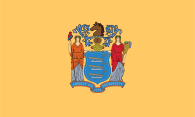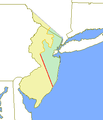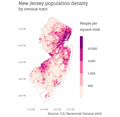Portal:New Jersey
The New Jersey Portal New Jersey is a state situated within both the Mid-Atlantic and Northeastern regions of the United States. It is the most densely populated of all 50 U.S. states, and is situated at the center of the Northeast megalopolis. New Jersey is bordered on its north and east by New York state; on its east, southeast, and south by the Atlantic Ocean; on its west by the Delaware River and Pennsylvania; and on its southwest by Delaware Bay and Delaware. At 7,354 square miles (19,050 km2), New Jersey is the fifth-smallest state in land area, but with close to 9.3 million residents as of the 2020 United States census, its highest decennial count ever, it ranks 11th in population. The state capital is Trenton, and the state's most populous city is Newark. New Jersey is the only U.S. state in which every county is deemed urban by the U.S. Census Bureau with 13 counties included in the New York metropolitan area, seven counties in the Philadelphia metropolitan area, and Warren County part of the heavily industrialized Lehigh Valley metropolitan area. New Jersey was first inhabited by Paleo-Indians as early as 13,000 B.C.E., with the Lenape being the dominant Indigenous group when Europeans arrived in the early 17th century. Dutch and Swedish colonists founded the first European settlements in the state, with the British later seizing control of the region and establishing the Province of New Jersey, named after the largest of the Channel Islands. The colony's fertile lands and relative religious tolerance drew a large and diverse population. New Jersey was among the Thirteen Colonies that supported the American Revolution, hosting several pivotal battles and military commands in the American Revolutionary War. On December 18, 1787, New Jersey became the third state to ratify the United States Constitution, which granted it admission to the Union, and it was the first state to ratify the U.S. Bill of Rights on November 20, 1789. (Full article...) Selected article -
The Battle of the Assunpink Creek, also known as the Second Battle of Trenton, was a battle between American and British troops that took place in and around Trenton, New Jersey, on January 2, 1777, during the American Revolutionary War, and resulted in an American victory. Following the victory at the Battle of Trenton early in the morning of December 26, 1776, General George Washington of the Continental Army and his council of war expected a strong British counter-attack. Washington and his council decided to meet this attack in Trenton, and established a defensive position south of the Assunpink Creek.
Lieutenant General Charles Cornwallis led the British forces southward in the aftermath of the December 26 battle. Leaving 1,400 men under Lieutenant Colonel Charles Mawhood in Princeton, Cornwallis advanced on Trenton with about 5,000 men on January 2. His advance was significantly slowed due to defensive skirmishing by American riflemen under the command of Edward Hand, and the advance guard did not reach Trenton until twilight. After assaulting the American positions three times, and being repulsed each time, Cornwallis decided to wait and finish the battle the next day. Washington moved his army around Cornwallis's camp that night and attacked Mawhood at Princeton the next day. That defeat prompted the British to withdraw from most of New Jersey for the winter. Selected picture - Credit: Jim.henderson The Prudential Center (nicknamed "The Rock") is a multi-purpose indoor arena in Downtown Newark. The arena was designed by HOK Sport, with the exterior designed by Morris Adjmi Architects. It is the home of the New Jersey Devils. New Jersey news'Related portalsSelected biography -Morris Berg (March 2, 1902 – May 29, 1972) was an American professional baseball catcher and coach in Major League Baseball who later served as a spy for the Office of Strategic Services during World War II. He played 15 seasons in the major leagues, almost entirely for four American League teams, though he was never more than an average player and was better known for being "the brainiest guy in baseball." Casey Stengel once described Berg as "the strangest man ever to play baseball." Berg was a graduate of Princeton University and Columbia Law School, and he spoke several languages and regularly read ten newspapers a day. His reputation as an intellectual was fueled by his successful appearances as a contestant on the radio quiz show Information Please, in which he answered questions about the etymology of words and names from Greek and Latin, historical events in Europe and the Far East, and ongoing international conferences. (Full article...)Did you know? -
General imagesThe following are images from various New Jersey-related articles on Wikipedia.
TopicsQuality content
CategoriesThings you can do
For more information on how you can help, see the WikiProject New Jersey. Associated WikimediaThe following Wikimedia Foundation sister projects provide more on this subject:
Discover Wikipedia using portals |












































































